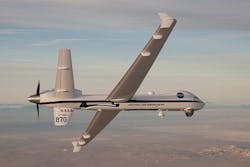DARPA seeks to improve machine autonomy to enable its use in safety-critical aircraft applications
ARLINGTON, Va. – U.S. military researchers will brief industry next month on a project to improve machine autonomy technology sufficiently to enable its use in safety-critical applications such as unmanned autonomous aircraft operating together with passenger planes in controlled airspace.
Officials of the U.S. Defense Advanced Research Projects Agency (DARPA) in Arlington, Va., will sponsor a proposers day from 9 a.m. to 5 p.m. eastern time on 15 Aug. 2017 on the upcoming Assured Autonomy project (DARPA-SN-17-62). Industry briefings will be at the DARPA Conference Center, 675 N. Randolph St., in Arlington, Va.
Autonomous systems increasingly are critical to the military, and researchers have made tremendous advances in the last decade -- particularly for unmanned vehicles that operate in the air, on the ground, and in the ocean.
Enabling these advances in machine autonomy have been innovations in sensor and actuator technologies; computing technologies; control theory; design methods and tools; and modeling and simulation technologies.
Related: ASSETT to apply artificial intelligence and machine autonomy to submarine combat systems
In spite of these advances, however, adoption of such systems in safety-critical DOD applications remains challenging and controversial. Designing in reliability to ensure trust is key to widespread use of machine autonomy.
The upcoming DARPA Assured Autonomy project seeks to assure that systems will operate safely and perform as expected, which will promote trust in machine autonomy and speed its adoption.
The goal of the Assured Autonomy program is to develop rigorous design and analysis technologies to guarantee safety of autonomous machines that are able to learn on their own, based on experience.
This project will center on military autonomous vehicles. It will produce a set of publicly available software tools for use in commercial and defense sectors. DARPA seeks innovative techniques that render the learning algorithms inherently safe by incorporating safety constraints in the learning process, while meeting learning objectives.
Industry briefings will familiarize companies and colleges with the program's goals, identify potential proposers, and answer questions. Those attending may request one-on-one meetings with DARPA researchers.
Those interested should register for the Assured Autonomy Proposers Day online at www.schafertmd.com/darpa/i2o/assuredautonomy/pd no later than 10 Aug. 2017.
Email questions or concerns to DARPA at [email protected]. More information is online at https://www.fbo.gov/spg/ODA/DARPA/CMO/DARPA-SN-17-62/listing.html.
Learn more: search the Aerospace & Defense Buyer's Guide for companies, new products, press releases, and videos

